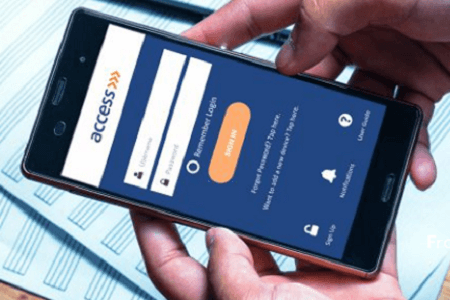Mobile Banking is a value-added service offered by a bank to enable customers to conveniently and securely conduct their banking transactions on their mobile phones. A mobile banking App from your Bank will enable you to transfer funds, check your account balance and statement, and conduct other banking transactions without having to visit your bank. You can also buy airtime and pay utility bills with the mobile banking platform.
How does Mobile Banking work?
Depending on your bank, mobile banking services are offered mostly via a Mobile App on Android or iOS, or USSD or SMS. Some banks will offer all options but others will only offer only one or more options.
Mobile banking apps will require a smartphone. Most banks now have Mobile Apps to help conveniently conduct your banking transactions on your phone. You can confirm from your bank if they have a mobile app that is supported by your phone to ease your banking.
If they do you can go ahead and download it from the App Store of your platform. You will need to apply with your bank for the password that will enable you to log in.
Authorizing a transaction will require a hardware token or one-time PIN sent to your mobile phone via SMS.
Mobile banking apps are easier to use because users can easily navigate their transactions through user-friendly menus. Hence, users do not have to memorize SMS or USSD commands for transactions, making them very convenient. However, using a Mobile Banking App will require a smartphone and internet access.
SMS and USSD-based mobile banking platforms have the advantage of being platform-neutral. They can be used on all types of mobile phones and usually, no download is required.
However, you have to memorize the codes required to engage in banking transactions. For example, Transfer 30000 1324 1234567890 could mean a Transfer of ₦30,000 to account number 1234567890. 1324 could be the PIN for authorizing the transaction.
GTBank offers the *737# USSD Banking service that allows you to use USSD to transfer funds instantly to any bank in Nigeria as well as pay bills. Check here.
What you can do with Mobile Banking Services
As a minimum, most platforms will enable you to check your account balance and statements, as well as transfer funds within your accounts in the same bank. However, most innovative mobile banking platforms will support fund transfers across different banks.
Your platform can also be used to pay for services, especially services that you currently go to the bank to pay for. Such services include utility bills (Electricity, Pay TV, Water, etc) and taxes.
You can also buy airtime on most mobile networks including MTN, Glo, Airtel, and 9Mobile via the mobile banking platform. Services offered by mobile banking may be limited compared to Internet banking.
How to get Mobile Banking
First, you need to have an account with the bank. Like all other banking services, visit your bank to find out whether they offer mobile banking services and how you can join.
As we pointed out earlier, you may need to apply with your bank so that they can enable you to log in. The customer care people at your bank will provide you with all the details you need.
Is Mobile Banking similar to Mobile Money?
Mobile Banking is different from mobile money, though the line is getting thinner by the day. Some services can be paid for using your mobile banking platform. In addition, you can also instantly transfer money to people, which effectively means you can pay for goods and services with your mobile phone.
However, mobile money is a lot more versatile for making payments for goods and services. Mobile money enables you to create an e-wallet on your phone for making payments and is not essentially tied to your bank account. In fact, you do not even need a bank account to use some mobile money services.
On the other hand, mobile banking cannot be used if you do not have a bank account. The two also have different objectives. Mobile banking is aimed at making banking more convenient for account holders.
In addition, by reducing the need for customers to visit the bank for every transaction, it reduces congestion in banking halls. It focuses on enabling customers to handle transactions that would have brought them to the bank on their mobile phones.
Mobile money is aimed at reducing the circulation of cash and making paying for goods and services more convenient. It enables people to pay for goods and services without the need for cash.
So, mobile banking is banking-biased while mobile money is payment-biased. However, both can converge or work hand in hand. For example, it could be possible to fund the mobile money e-wallet from your mobile banking platform.







